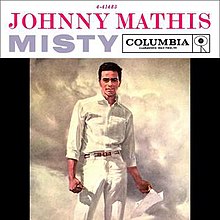From Wikipedia, the free encyclopedia
"Misty " is a jazz standard written in 1954 by pianist Erroll Garner . He composed it as an instrumental on the traditional 32-bar format and recorded it for the album Contrasts Johnny Burke . It became the signature song of Johnny Mathis , appearing on his 1959 album Heavenly U.S. Pop Singles chart later that year. Country and pop singer Ray Stevens had a number 14 hit with his version of "Misty" in 1975 on the Billboard Hot 100. This version reached number two in the United Kingdom. The song has been recorded many times, including versions by Ella Fitzgerald , Aretha Franklin , Frank Sinatra , Sarah Vaughan , and, most recently, by Alternative Rock Band QUI .
Johnny Mathis version Background Mathis heard Garner play the song and told him that he'd love to sing it if Garner had lyrics for it. Garner was in attendance when Mathis later recorded the song.[2] [citation needed
Chart performance
Weekly singles
Chart (1959–60)
Peak
U.S. Billboard Hot 100
12
Certifications Play Misty for Me Although there were already several released versions,[2] [citation needed It inspired Clint Eastwood to use the instrumental in his 1971 film Play Misty for Me
Ray Stevens version Background and release In 1975 Ray Stevens released an up-tempo country rendition of this song. It is the title track of his twelfth studio album of the same name . Stevens recounted that the song was recorded on the second take when experimenting in the studio. His version won a Grammy in the category of Music Arrangement of the Year.[3]
Chart performance
Weekly singles
Chart (1975)
Peak
Austrian Top 40
11
Australian Singles Chart
5
Canadian RPM Hot Country Singles
2
Canadian RPM Top Singles
15
Canadian RPM Adult Contemporary
6
Euro Hit 50
9
Ireland
2
New Zealand
11
South African Singles Chart
5
UK
2
U.S. Billboard Hot Country Singles
3
U.S. Billboard Hot 100
14
U.S. Billboard Easy Listening [4]
8
Year-end charts
Chart (1975)
Rank
Australia [5]
39
Canada RPM Top Singles [6]
135
New Zealand [7]
28
UK [8]
23
U.S. Billboard Hot 100 [9]
91
Other versions Count Basie , Dance Along with Basie [10] Hank Crawford , More Soul [10] Bing Crosby recorded the song in 1961[11] radio show and it was included in the album With All My Heart (2012)[12] Larry Coryell , Fallen Angel (1993)[13] Erroll Garner , Contrasts [10] Grammy Hall of Fame in 1991.[14] Mitch Miller for his album Other Voices (1957)Lesley Gore , I'll Cry If I Want To [15] Richard "Groove" Holmes , Soul Message [10] Ahmad Jamal , Heat Wave [10] Dave Koz , Lucky Man (1993)[16] Johnny Mathis , Heavenly [10] Carmen McRae , Sarah: Dedicated to You [10] Wes Montgomery , Complete Live at the Half Note (1965)[10] Steve Turre , In the Spur of the Moment (1999)[10] Sarah Vaughan (Vaughan and Violins [10] References
^ (1993) The Music of Johnny Mathis: A Personal Collection by Johnny Mathis [CD booklet]. New York: Columbia Records C4K-48932.
^ a b Johnny Mathis interviewed on the Pop Chronicles ^ Ray Stevens - About "Misty" and Live Performance YouTube ^ Whitburn, Joel (1993). Top Adult Contemporary: 1961–1993 . Record Research. p. 229.^ Steffen Hung. "Forum - 1970 (ARIA Charts: Special Occasion Charts)" . Australian-charts.com . Archived from the original on 2016-06-02. Retrieved 2016-08-29 . ^ "Archived copy" . Archived from the original on 2016-10-06. Retrieved 2016-05-15 .{{cite web }}: CS1 maint: archived copy as title (link )^ "Top Selling Singles of 1975 | The Official New Zealand Music Chart" . Nztop40.co.nz . 1975-12-31. Retrieved 2016-08-29 .^ "Britain's best selling records of '75" . Record Mirror . Retrieved June 13, 2016 .^ "Pop Singles" Billboard December 27, 1975: Talent in Action-8
^ a b c d e f g h i j Gioia, Ted (2012). The Jazz Standards . Oxford: Oxford University Press. p. 269. ISBN 978-0-19-993739-4 ^ "A Bing Crosby Discography" . BING magazine . International Club Crosby. Retrieved December 8, 2017 .^ "Allmusic.com" . Allmusic.com . Retrieved December 8, 2017 .^ Newsom, Jim. "Fallen Angel" . AllMusic . Retrieved 3 August 2018 . ^ "GRAMMY Hall Of Fame" . GRAMMY.org . Retrieved 2016-08-29 .^ Unterberger, R . "I'll Cry If I Want To" . Allmusic . Retrieved 2011-08-08 .^ Promis, Jose F. "Lucky Man" . AllMusic . Retrieved 3 August 2018 .
External links
Studio albums Compilation albums Live albums Box sets Singles Other Songs Videos Related articles
Studio albums Live albums Compilation albums Other album appearances Extended plays Songs Related topics

